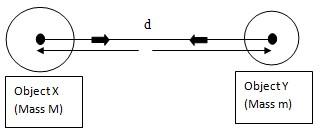Gravitation:
Gravitation is defined as the natural phenomenon of attraction exerted by every particle of matter in the universe with mass or energy. Gravitational force is defined as the force of attraction between two objects.
Universal law of Gravitation:
Universal law of Gravitation states that every object in the universe attracts every other object. This is because of the force which is proportional to the product of their masses and inversely proportional to the square of the distance between them. The force is along the line joining the centers of two objects.

Consider two objects X and Y of masses M and m lies at a distance d from each other as shown in the figure and the force of attraction between two objects is F.
According to the universal law of gravitation,
The force between two objects is directly proportional to the product of their masses, that is

And the force between two objects is inversely proportional to the square of the distance between them,

Here, G = constant of proportionality and is called the universal gravitation constant.
Now,

SI unit of 
The value of  and is found by Henry Cavendish.
and is found by Henry Cavendish.
Force of gravitation due to earth is called gravity. Ex – Falling apple. SI unit of g = m /s2
Calculations:
Ex-1: According to the universal law of gravitation, the force of attraction between two objects is directly proportional to the product of their ………..
a) weight
b) Velocity
c) Acceleration
d) Masses
Answer: Universal law of Gravitation states that every object in the universe attracts every other object. This is because of the force which is proportional to the product of their masses and inversely proportional to the square of the distance between them
Ex-2: Gravitational force of the earth is called as…………….
e) Gravity
f) Velocity
g) Density
h) Mass
Answer: Gravitational force of the earth is called as Gravity.
Ex-3: What is the value of G?
a) 6.672 x 10-11 N m2/ Kg2
b) 6.673 x 10-11 N m2/ Kg2
c) 6.672 x 10-12 N m2/ Kg2
d) 6.672 x 10-10 N m2/ Kg2
Answer: The value of G is 6.672 x 10-11 N m2/ Kg2